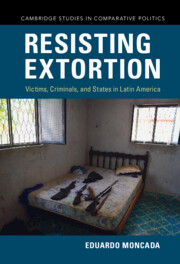Book contents
- Resisting Extortion
- Cambridge Studies in Comparative Politics
- Resisting Extortion
- Copyright page
- Dedication
- Contents
- Figures, Tables, and Maps
- Acknowledgments
- Abbreviations
- Part I Resistance to Criminal Extortion
- Part II Everyday Resistance and Piecemeal Vigilantism
- 3 Everyday Resistance
- 4 Piecemeal Vigilantism
- Part III Collective Vigilantism and the Coproduction of Order
- Appendix Researching Resistance to Criminal Extortion
- References
- Index
- Series page
3 - Everyday Resistance
from Part II - Everyday Resistance and Piecemeal Vigilantism
Published online by Cambridge University Press: 23 December 2021
- Resisting Extortion
- Cambridge Studies in Comparative Politics
- Resisting Extortion
- Copyright page
- Dedication
- Contents
- Figures, Tables, and Maps
- Acknowledgments
- Abbreviations
- Part I Resistance to Criminal Extortion
- Part II Everyday Resistance and Piecemeal Vigilantism
- 3 Everyday Resistance
- 4 Piecemeal Vigilantism
- Part III Collective Vigilantism and the Coproduction of Order
- Appendix Researching Resistance to Criminal Extortion
- References
- Index
- Series page
Summary
This chapter traces two pathways to everyday resistance to criminal victimization. The first pathway takes place when criminal actors have long time horizons. The first part of the chapter illustrates this pathway by comparing four empirical cases across El Salvador and Mexico where victims favored everyday resistance because the criminal actors enjoyed positions of strength in the absence of state crackdowns or criminal competition and they provided victims with some goods and services. The second pathway takes place when victims favor ending victimization but lack the organizational capacity to mobilize collectively and face police that are captured by criminals. I illustrate the second pathway using a within-case analysis of resistance by informal vendors in Medellín who faced these conditions and thus pursued everyday resistance to contest the strategies of domination that the criminal actor invoked to enforce extortion, but which could not end victimization.
Keywords
- Type
- Chapter
- Information
- Resisting ExtortionVictims, Criminals, and States in Latin America, pp. 57 - 91Publisher: Cambridge University PressPrint publication year: 2022

